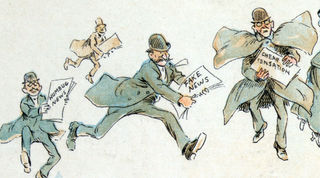Media
How to Keep Fake News Out of Your Head
The defense of your mind against digital lies begins with you.
Posted July 18, 2019 Reviewed by Hara Estroff Marano
We are floundering in the fake news era. This is a deep, dark ocean, and too many of us don’t know how to swim.
Remember when the Internet was going to educate us and elevate our overall intelligence as a species? (The '90s were so sweet and naïve, weren’t they?) All that good stuff may happen, but at present, digital fake news is deceiving countless minds. Millions of websites have been weaponized with content designed to attack our cognitive vulnerabilities. Every day, YouTube videos pump nonsense into the minds of millions. Billions of emails fly around the world delivering irresistible links to madness.
All of this is possible because most people have not bothered to learn the basics of human thought—biases, short cuts, and perception errors—that lead us to so easily believe nonsense and lies.

I disagree with calls for governments and corporations to clean up the mess that is online fake news. First, there is a conflict of interest—these are often the sources of dishonest content. Second, freedom of speech is an invaluable concept that should not be weakened. Third, it is a defeatist victim mentality to expect someone else to protect your brain. Police your own thoughts. Don’t be such an easy mark. Good thinking is not as difficult as you may imagine.
In my book, Think Before You Like, I detail several simple defenses that everyone can utilize when consuming online information. Here is a condensed list:
• Be skeptical of everything. Never accept any claim, story, or news article as 100 percent true. Leave the door slightly ajar for intellectual escape. Take the stance of a good scientist and remember that all knowledge is provisional. Be humble—you don’t know everything about everything—and cling to a bit of uncertainty in all things so that you never tie yourself too tightly to a concept that might turn out to be a mistake or lie.
Doubt is a good thing. Skepticism is not cynicism. Thinking critically does not mean you are closed-minded or negative. Doing so is safe and wise. We should approach all news we encounter in this way, regardless of the source. Even the BBC and the New York Times make mistakes. Even the best journalists are human, and that means they are not perfect every time. Don’t rise to a constant state of paranoia, but do maintain a high level of awareness and concern about what you are taking in.
• Consider the source. While we cannot trust any source completely and without reservation, the reputation of a source is a key step in assessing a news article. One of the first things I do when I encounter a news article, post, or anything online is to look at the source. I rarely, if ever, read the entire text of a news story without first noting the source.
When many people land on a webpage, however, they begin reading the content. Even if they are thoughtful enough to be concerned with errors, bias, and dishonesty, they make the key mistake of assuming that any problems present will become apparent while reading. This is not necessarily so.
Before I waste my time and risk letting lies or nonsense creep into my mind, I ask myself the following questions: Who is behind this website? Who wrote the material? What is their track record, and do they have any obvious agendas or biases? Who took this photo and wrote the caption under it? Who is paying the bills here?
If I don’t know the answers to at least some of these questions, or if there is a clear mission that compromises truth and reality, I may still read the article, but my capacity to absorb it as fact shrinks to almost nothing. Before believing, I will need to see more of the same information from better sources.
Specifically related to this, I have observed people conduct Internet searches when trying to find an answer or research a topic, and it is shocking how few check the source before plunging into the information. This is a critical error that leads people off course.
There are times when an article should be dismissed before reading, simply due to its source. I know this may seem harsh, maybe even closed-minded, but it’s not. It’s good thinking. There is just too much bad information on the Web. For example, if a middle school student is researching basic facts about the Holocaust for a class project, the last thing she needs to do is land on some Neo-Nazi site and waste her time reading an article that claims it never happened.
• Google is not a god. I know, Google is great. How did we ever live without it? But it’s still just a search engine. It feeds you results based on the query and perhaps your online identity as determined by the algorithms working behind your back. Google is not your personal librarian. It’s not an arbiter of truth, a champion of science and reason, or anything else like that.
It’s a search engine. You put words in, it spits out links to relevant websites. This is merely the starting point and not the end of the research road. You must think and sort out the wheat from the chaff, the real from the fake.
• Slow down. When reading news, it’s wise to withhold fully accepting a claim or digging in on a position until you know more, preferably from multiple sources. Did you just read that Kanye West kicked a puppy? Wait and gather more intel before deleting all of his songs from your playlist.
Never forget that an important component of news is speed, never more so than today. But while speed is a priority for news media companies, it doesn’t have to be yours. Let others rush in and make mistakes. In almost every case, you have the luxury of time. Slow down and get it right. I advise thinking of news, all of it, as a suggestion of a possible reality. Think of a news article not as an endpoint but as a signpost along the way on your journey toward the truth.
• Where is everybody else? If no one else is reporting a particular story, ask yourself why. If you encounter a lone report that describes the opening of a new habitat featuring a live Bigfoot specimen at the San Diego Zoo or the invasion of South Korea by North Korean killer robots, chances are good that it’s fake news.
The absence of similar reports by multiple news organizations is a gigantic red flag. Cable news networks are hyper-focused on being fast. If they aren’t reporting on a big story, it’s probably because they figured out that it’s unsupported by evidence or credible sources and unlikely to be true.
• Understand the difference between opinion and news. Many people don’t recognize the fundamental difference between opinion or commentary and news. Straight news is about the hard facts of an event and may include direct quotes from an interview subject related to the topic. Commentary is an open arena where writers or broadcasters can express feelings, hunches, and opinions. Both are important, of course, but confusing one for the other can lead to problems.
• Check the URL carefully. Many fake news sites seek to fool people with a Web address that is similar to a legitimate news site. One common trick is the have a URL that is identical to a major news company except for a couple of extra letters at the end. For example, “.com.co” is not the same as “.com.” At a glance, for example, you might assume that ABCNews.com.co and BostonTribune.com are the Web addresses of real and respectable news organizations. But they aren’t. Both specialize in publishing fake news articles. The first one has nothing to do with the ABC News most are familiar with, and the other is not the website of a respected Boston newspaper, as one might assume.
• Don’t litter. Another significant problem is the habit many seem to have of sharing news links after doing nothing more than reading the headline. How can anyone intelligently assess an article without reading it first? About 6 in 10 people are guilty of this, according to a recent study.
In 2016, a satirical site published an article with a catchy headline but gibberish for text. Nearly 46,000 people shared it. Please don’t do this! In many circumstances, sharing a news article implies an endorsement. Understand that headlines are there to catch the eye, provoke, and excite the mind; and they often are written by an editor, someone other than the person who wrote the article itself.
As a result, headline and article do not always share a consistent theme and tone. Most troublesome, however, is that some fake news is designed to look credible at first glance. The lies only emerge somewhere down in the text. The headline may be intentionally written to make the bogus text below it seem respectable.
Don’t be an accomplice. If you can’t bother to read the story and assess its accuracy, then don’t share the story. Don’t add fuel to a fire that already burns up too much invaluable intellectual capital. Spreading fake news drags us all down. When engaged on social media, strive to act in ways that uplift us and help make humankind wiser and more sensible.
• Reduce the flow. Part of the reason fake news has exploded on social media is that it is so easy for one to become fatigued or at least distracted and cognitively compromised by the never-ending avalanche of information. We don’t have infinite cognitive energies. The best of us can be worn down to a point where we are more likely to believe nonsense and pass it on to others.
An interesting study published in Nature Human Behaviour in 2017 suggests that people are more vulnerable to falling for fake stories when the flow of news becomes too great to pay close enough attention. Considering this, it may be a good idea to restrict the volume of your news exposure. Be selective. More is not always better when it comes to making sensible assessments.
• Remember who you are. We humans don’t do well at automatically identifying irrational beliefs and fraudulent claims for what they are. Our brains, for all their glorious powers, are suckers for a good story, an exciting image, a convenient lie, or just plain old gossip.
We must pause and think so that we may give ourselves the best chance to make the right decision about what to believe. We must second-guess our own minds.
FINAL THOUGHTS ON THE WAR FOR YOUR THOUGHTS
Strive to make critical thinking your automatic reaction to online encounters with news and other information. This won’t make you invulnerable and incapable of making missteps, of course.
Do not forget for one second that you are under constant threat of intellectual assault from countless throngs of deluded believers pushing endless streams of baloney and madness. There also are countless profit-motivated, agenda-driven, and just plain dishonest companies and people who show up and work hard every day with the aim of fooling you for their own gain. Defend your mind.
I find some reason for hope and optimism amid the current explosion of fake news we are experiencing. There is a chance that people finally will be forced, after being suckered one too many times, to recognize and admit the obvious: We must think before we believe. Maybe financial cost, political exploitation, or just plain humiliation will motivate more of us to finally become our own editors and stop trusting every story that comes along. And that would be progress.




